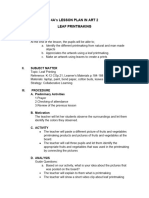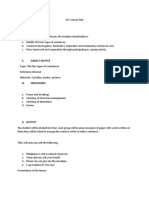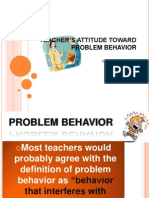0 ratings0% found this document useful (0 votes)
236 viewsPrinciples of Learning
The document outlines 9 principles of learning:
1. Learning occurs inside the learner and is activated by the learner, not solely based on external factors like a teacher.
2. Learning involves discovering the personal meaning and relevance of ideas for oneself and one's community.
3. Learning is a consequence of experiences that allow people to become responsible and independent through experiencing responsibility and independent behavior.
4. Learning is a cooperative and collaborative process that fosters learning through interdependence with others.
Uploaded by
MelCopyright
© © All Rights Reserved
Available Formats
Download as PPTX, PDF, TXT or read online on Scribd
0 ratings0% found this document useful (0 votes)
236 viewsPrinciples of Learning
The document outlines 9 principles of learning:
1. Learning occurs inside the learner and is activated by the learner, not solely based on external factors like a teacher.
2. Learning involves discovering the personal meaning and relevance of ideas for oneself and one's community.
3. Learning is a consequence of experiences that allow people to become responsible and independent through experiencing responsibility and independent behavior.
4. Learning is a cooperative and collaborative process that fosters learning through interdependence with others.
Uploaded by
MelCopyright
© © All Rights Reserved
Available Formats
Download as PPTX, PDF, TXT or read online on Scribd
You are on page 1/ 11
Principles of Learning
How do we define learning?
Learning is the acquisition of knowledge-base used with
fluency to make sense of the world, solve problems and
make decisions.
1. acquisition of knowledge-base
2. fluency
3. make sense of the world
4. solve problems
5. make decisions
Principles of Learning from Horne and Pine
1. Learning is an experience which occurs inside the
learner and is activated by the learner.
learning is not only a function of what a teacher does to
or say to, or provides for a learner
Students learn what they want to learn, they see what
they want to see and hear what they want to hear.
2. Learning is the discovery of the personal meaning
and relevance of ideas.
Learning is a process which requires the
exploration od ideas in relation to self and
community.
3. Learning is a consequence of experience
People become responsible when they have
really assumed responsibility, they become
independent when they have experienced
independent behavior, they begin to feel
important when they are important to
somebody, they feel liked when someone
likes them,
4. Learning is a cooperative and collaborative
process. Cooperation fosters learning
Students enjoy functioning independently but they
also enjoy functioning interdependently.
5. Learning is an evolutionary process
behavioral change requires time and patience.
Learning situations characterized by free and open
communication, confrontation, acceptance, respect, the
right to make mistake, self-revelation, cooperation and
collaboration.
Change takes time. Let us not expect results overnight.
6. Learning is sometimes a painful process.
if growth is occur, pain is often necessary.
It may be good to make our students
realize that learning is a difficult task.
7. One of the richest resources for learning is
the learner himself.
each individual has an accumulation of
experiences, ideas, feelings and attitudes
which compromise a rich vein of material foe
problem solving and learning.
8. The process of learning is emotional as well
as intellectual.
People are feeling beings as well as thinking
beings and when their feelings and thoughts
are in harmony, learning is maximized.
9. The process of problem solving and
learning is highly unique and individual.
Each student has his own unique styles of
learning and solving problems.
You might also like
- Principles of Teaching by Francisco Zulueta100% (1)Principles of Teaching by Francisco Zulueta5 pages
- Technology Integration Lesson Plan: (Blooms Taxonomy: Create)100% (1)Technology Integration Lesson Plan: (Blooms Taxonomy: Create)4 pages
- Reflection Application of Learner Centered Teaching PhilosophyNo ratings yetReflection Application of Learner Centered Teaching Philosophy2 pages
- How Physical Exercise Help and Its BenefitsNo ratings yetHow Physical Exercise Help and Its Benefits1 page
- Table of Specification 2nd Grading Test English 6 Sy 2019 2020 Sept 24 2019No ratings yetTable of Specification 2nd Grading Test English 6 Sy 2019 2020 Sept 24 20192 pages
- Detailed Lesson Plan (DLP) Format: Curriculum GuideNo ratings yetDetailed Lesson Plan (DLP) Format: Curriculum Guide4 pages
- Developmental Lesson Plan: Pre-AssessmentNo ratings yetDevelopmental Lesson Plan: Pre-Assessment9 pages
- Assignment 5 - PEd1 - Final Term CoverageNo ratings yetAssignment 5 - PEd1 - Final Term Coverage6 pages
- Module 3-Curriculum Design: 1 Semester 2021-2022 FHRLNo ratings yetModule 3-Curriculum Design: 1 Semester 2021-2022 FHRL6 pages
- Behaviorism, Cognitivism, ConstructivismNo ratings yetBehaviorism, Cognitivism, Constructivism14 pages
- Approaches, Methods, Strategies, TechniquesNo ratings yetApproaches, Methods, Strategies, Techniques8 pages
- EDUC 110 PPT - Demands of Society As A Person & ProfessionalNo ratings yetEDUC 110 PPT - Demands of Society As A Person & Professional39 pages
- Process Oriented Performance Based AssessmentNo ratings yetProcess Oriented Performance Based Assessment29 pages
- Background On Student Teaching: Aklan State University-College of Fisheries and Marine SciencesNo ratings yetBackground On Student Teaching: Aklan State University-College of Fisheries and Marine Sciences8 pages
- Nueva Ecija University of Science and Technology: A. Process Oriented Learning CompetenciesNo ratings yetNueva Ecija University of Science and Technology: A. Process Oriented Learning Competencies40 pages
- Principles of Teaching According To Various Authors: (Fleming 1996)No ratings yetPrinciples of Teaching According To Various Authors: (Fleming 1996)20 pages
- Cooperative Learning Approach in An Outcomes Based EnvironmentNo ratings yetCooperative Learning Approach in An Outcomes Based Environment10 pages
- Development and Use of Non-Digital and Conventional Instructional MaterialsNo ratings yetDevelopment and Use of Non-Digital and Conventional Instructional Materials17 pages
- Visual, Auditory, and Kinesthetic LearnersNo ratings yetVisual, Auditory, and Kinesthetic Learners2 pages
- 1.3 - 4 Levels of Outcome-Based EducationNo ratings yet1.3 - 4 Levels of Outcome-Based Education7 pages
- Kolehiyo NG Lungsod NG Lipa: PEC 105 NoneNo ratings yetKolehiyo NG Lungsod NG Lipa: PEC 105 None6 pages
- Measurement, Assessment and Evaluation in Outcomes-Based EducationNo ratings yetMeasurement, Assessment and Evaluation in Outcomes-Based Education3 pages
- Insight (April 14) TLE Conceptual FrameworkNo ratings yetInsight (April 14) TLE Conceptual Framework3 pages
- Teacher's Attitude Toward Problem BehaviorNo ratings yetTeacher's Attitude Toward Problem Behavior10 pages
- Lesson 3 and 4: The Poetry The Element of The Short Story: I. ObjectivesNo ratings yetLesson 3 and 4: The Poetry The Element of The Short Story: I. Objectives6 pages
- Lesson 2: General Types and Forms of Literature: A. Prose Fiction B. Poetry C. Drama D. Nonfiction ProseNo ratings yetLesson 2: General Types and Forms of Literature: A. Prose Fiction B. Poetry C. Drama D. Nonfiction Prose4 pages
- Lesson 1: Survey in The Philippine HistoryNo ratings yetLesson 1: Survey in The Philippine History7 pages
- Philosophy of Education Is A Label Applied To The Study of The PurposeNo ratings yetPhilosophy of Education Is A Label Applied To The Study of The Purpose4 pages
- Principles of Normal Development in Infancy and Early PregnancyNo ratings yetPrinciples of Normal Development in Infancy and Early Pregnancy14 pages
- Dimension of Development:: Health AwarenessNo ratings yetDimension of Development:: Health Awareness28 pages
























































































